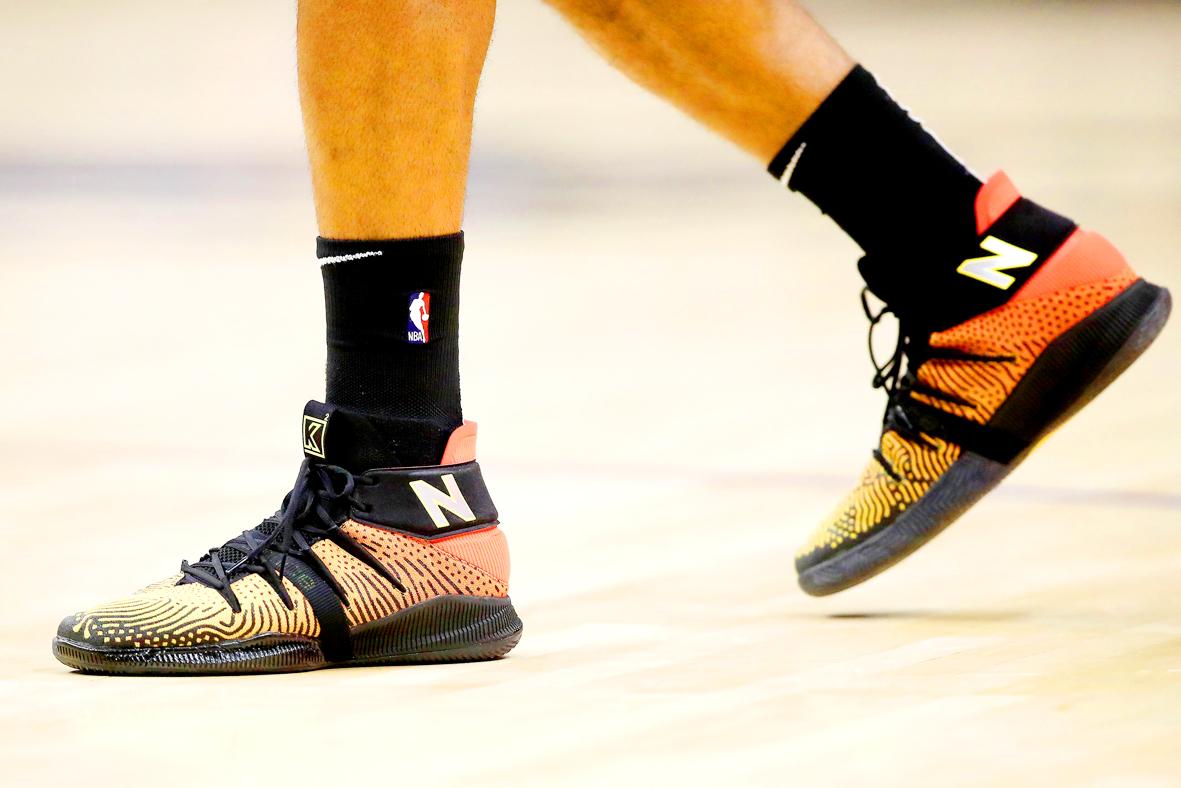Pou Chen Corp (寶成工業), the world’s largest maker of sports shoes, apparel and accessories, is mulling pay cuts and furloughs for its Taiwanese employees as orders slump amid the COVID-19 pandemic.
The Taichung-based company — whose clients include Nike Inc, Adidas AG, Puma AG, New Balance Athletic Shoe Inc and Timberland Co — is contemplating temporary pay cuts of 10 percent, furloughs and other cost-saving measures that would affect 3,000 employees in Taiwan and officials based in overseas factories.
Pou Chen spokesman Ho Ming-kun (何明坤) told reporters that the firm has not made a final decision, as it requires the consent of its workers’ union and the government.

Photo: AFP
The 51-year-old company is seeking to furlough employees for six days per month for three months, which might be extended depending on how the pandemic pans out, Ho said.
“It is better to be furloughed than laid off” in hard times, local Chinese-language media quoted Pou Chen employees as saying after a meeting with officials about the issue on Monday night.
Pou Chen’s first-quarter revenue tumbled 22.4 percent year-on-year to NT$59.46 billion (US$1.98 billion), the weakest in six years, company data showed.
Orders have reportedly plummeted 50 percent in the current quarter, with little visibility beyond, analysts said.
Nike, Adidas and other international sports brands have shut down retail outlets in the US, Europe and elsewhere to support social distancing orders by governments around the world to curb the spread of the virus, analysts said, adding that indefinite suspensions of major sports events have compounded the problem.
The company’s original equipment manufacturing (OEM) business for major footwear brands reported that sales declined by up to 16.4 percent year-on-year in the first two months of this year, Yuanta Securities Investment Consulting Co (元大投顧) said in a note earlier this month.
“Pou Chen’s OEM shoe sales volume was 322.4 million units in 2019, down 1.1 percent year-on-year,” Yuanta said. “Given that 60 percent of its OEM shoe business is from the EU and US markets, which will likely be impacted by COVID-19 in the first half of 2020, we estimate its OEM shoe business sales would fall by up to 10 percent year-on-year this year.”
The proposed 10 percent pay cuts would apply to employees and officials, including CEO Tsai Pei-chun (蔡佩君), daughter of the company’s founder, Tsai Chi-jui (蔡其瑞), media reports said.
It would be the first time Pou Chen had invoked such measures to stay afloat, and it said it hoped employees would understand and help the company survive the crisis. Pou Chen employs 350,000 workers at factories in China, Vietnam and Indonesia.
Operations in overseas markets are not covered by the belt-tightening scheme, local media said.
Shares of Pou Chen yesterday fell 5.54 percent to NT$27.30 in Taipei trading, underperforming the broader market’s 2.82 percent decline, Taiwan Stock Exchange data showed.
Earlier, the firm’s Vietnamese unit, Pouyuen Vietnam Co, suspended production for two days after failing to meet local rules on social distancing to curb the outbreak.

In Italy’s storied gold-making hubs, jewelers are reworking their designs to trim gold content as they race to blunt the effect of record prices and appeal to shoppers watching their budgets. Gold prices hit a record high on Thursday, surging near US$5,600 an ounce, more than double a year ago as geopolitical concerns and jitters over trade pushed investors toward the safe-haven asset. The rally is putting undue pressure on small artisans as they face mounting demands from customers, including international brands, to produce cheaper items, from signature pieces to wedding rings, according to interviews with four independent jewelers in Italy’s main

Japanese Prime Minister Sanae Takaichi has talked up the benefits of a weaker yen in a campaign speech, adopting a tone at odds with her finance ministry, which has refused to rule out any options to counter excessive foreign exchange volatility. Takaichi later softened her stance, saying she did not have a preference for the yen’s direction. “People say the weak yen is bad right now, but for export industries, it’s a major opportunity,” Takaichi said on Saturday at a rally for Liberal Democratic Party candidate Daishiro Yamagiwa in Kanagawa Prefecture ahead of a snap election on Sunday. “Whether it’s selling food or

CONCERNS: Tech companies investing in AI businesses that purchase their products have raised questions among investors that they are artificially propping up demand Nvidia Corp chief executive officer Jensen Huang (黃仁勳) on Saturday said that the company would be participating in OpenAI’s latest funding round, describing it as potentially “the largest investment we’ve ever made.” “We will invest a great deal of money,” Huang told reporters while visiting Taipei. “I believe in OpenAI. The work that they do is incredible. They’re one of the most consequential companies of our time.” Huang did not say exactly how much Nvidia might contribute, but described the investment as “huge.” “Let Sam announce how much he’s going to raise — it’s for him to decide,” Huang said, referring to OpenAI

Nvidia Corp’s negotiations to invest as much as US$100 billion in OpenAI have broken down, the Wall Street Journal (WSJ) reported, exposing a potential rift between two of the most powerful companies in the artificial intelligence (AI) industry. The discussions stalled after some inside Nvidia expressed concerns about the transaction, the WSJ reported, citing unidentified people familiar with the deliberations. OpenAI makes the popular chatbot ChatGPT, while Nvidia dominates the market for AI processors that help develop such software. The companies announced the agreement in September last year, saying at the time that they had signed a letter of intent for a strategic